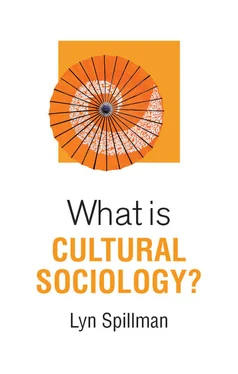1 Series title
2 Title page What is Cultural Sociology? LYN SPILLMAN polity
3 Copyright page
4 Acknowledgments
5 1 Introduction Rituals, symbols, values, norms, and categories The idea of culture Culture in sociology Cultural sociology and processes of meaning-making Three lenses on meaning-making processes Conclusion
6 2 Making Meaning Central Convention, structure, and materiality in symbolic forms Cognitive categories and symbolic boundaries Schemas, frames, valuation, commensuration Discursive fields, binary codes, narratives, and genres Materiality and iconicity Conclusion
7 3 Meaning and Interaction Intention and reference in processes of meaning-making Habitus and practice Cultural repertoires and strategies of action Idiocultures and subcultures Group styles and scenes Performance Conclusion
8 4 Producing Meaning The socio-historical context of meaning-making: beyond reflection theory Cultural reproduction, change, and the problem of “articulation” The production of culture Cultural fields Conclusion
9 5 Conclusion: Landscapes, Stages, and Fields Foundations and presuppositions of cultural sociology Landscapes, stages, and fields Exploring the cultural sociology of What is Cultural Sociology? What is missing from What is Cultural Sociology? Debates and difference among cultural sociologists Using the conceptual tools of cultural sociology
10 References
11 Index
12 End User License Agreement
1 Cover
2 Contents
3 1 Introduction
1 ii
2 iii
3 iv
4 vi
5 vii
6 1
7 2
8 3
9 4
10 5
11 6
12 7
13 8
14 9
15 10
16 11
17 12
18 13
19 14
20 15
21 16
22 17
23 18
24 19
25 20
26 21
27 22
28 23
29 24
30 25
31 26
32 27
33 28
34 29
35 30
36 31
37 32
38 33
39 34
40 35
41 36
42 37
43 38
44 39
45 40
46 41
47 42
48 43
49 44
50 45
51 46
52 47
53 48
54 49
55 50
56 51
57 52
58 53
59 54
60 55
61 56
62 57
63 58
64 59
65 60
66 61
67 62
68 63
69 64
70 65
71 66
72 67
73 68
74 69
75 70
76 71
77 72
78 73
79 74
80 75
81 76
82 77
83 78
84 79
85 80
86 81
87 82
88 83
89 84
90 85
91 86
92 87
93 88
94 89
95 90
96 91
97 92
98 93
99 94
100 95
101 96
102 97
103 98
104 99
105 100
106 101
107 102
108 103
109 104
110 105
111 106
112 107
113 108
114 109
115 110
116 111
117 112
118 113
119 114
120 115
121 116
122 117
123 118
124 119
125 120
126 121
127 122
128 123
129 124
130 125
131 126
132 127
133 128
134 129
135 130
136 131
137 132
138 133
139 134
140 135
141 136
142 137
143 138
144 139
145 140
146 141
147 142
148 143
149 144
150 145
151 146
152 147
153 148
154 149
155 150
156 151
What is Cultural Sociology?
LYN SPILLMAN
polity
Copyright © Lyn Spillman 2020
The right of Lyn Spillman to be identified as Author of this Work has been asserted in accordance with the UK Copyright, Designs and Patents Act 1988.
First published in 2020 by Polity Press
Polity Press
65 Bridge Street
Cambridge CB2 1UR, UK
Polity Press
101 Station Landing
Suite 300
Medford, MA 02155, USA
All rights reserved. Except for the quotation of short passages for the purpose of criticism and review, no part of this publication may be reproduced, stored in a retrieval system or transmitted, in any form or by any means, electronic, mechanical, photocopying, recording or otherwise, without the prior permission of the publisher.
ISBN-13: 978-1-5095-2280-4
ISBN-13: 978-1-5095-2281-1 (pb)
A catalogue record for this book is available from the British Library.
Library of Congress Cataloging-in-Publication Data
Names: Spillman, Lyn, author.
Title: What is cultural sociology? / Lyn Spillman.
Description: Cambridge, UK ; Medford, MA : Polity, 2020. | Series: What is sociology? series | Includes bibliographical references and index. | Summary: “Offering a concise answer to the question “What is Cultural Sociology?,” this book provides an overview of what you need to know to do cultural sociology. Spillman demonstrates many of the conceptual tools cultural sociologists use to help understand how people make meaning, with vivid examples from this rich and ubiquitous feature of our lives”-- Provided by publisher.
Identifiers: LCCN 2019024009 (print) | LCCN 2019024010 (ebook) | ISBN 9781509522804 (hardback) | ISBN 9781509522811 (paperback) | ISBN 9781509522842 (epub)
Subjects: LCSH: Culture.
Classification: LCC HM621 .S653 2020 (print) | LCC HM621 (ebook) | DDC 301--dc23
LC record available at https://lccn.loc.gov/2019024009
LC ebook record available at https://lccn.loc.gov/2019024010
Typeset in 10.5 on 12pt Sabon
by Fakenham Prepress Solutions, Fakenham, Norfolk NR21 8NL
Printed and bound in the UK by TJ International Limited
The publisher has used its best endeavours to ensure that the URLs for external websites referred to in this book are correct and active at the time of going to press. However, the publisher has no responsibility for the websites and can make no guarantee that a site will remain live or that the content is or will remain appropriate.
Every effort has been made to trace all copyright holders, but if any have been overlooked the publisher will be pleased to include any necessary credits in any subsequent reprint or edition.
For further information on Polity, visit our website: politybooks.com
I am grateful for all my many encounters and conversations over the years with cultural sociologists who have developed the field from its inception to its diversity and strength today. They have made cultural sociology an intellectual home I could not have imagined when I first wondered long ago why sociologists did not seem to talk about culture. Among all these colleagues over the years, I have been particularly fortunate in the support, encouragement, and friendship of Jeffrey Alexander, Nina Eliasoph, Paul Lichterman, and Ann Swidler, even though each of them might well critique the picture of the field presented in this book.
I also thank Jonathan Skerrett, who motivated the project, Karina Jákupsdóttir, for her patience in seeing it through, and Justin Dyer, for his impressive copy-editing. The manuscript benefited from the comments of three anonymous reviewers. Michael Strand also offered helpful comments. Colleagues and students in Sociology at the University of Notre Dame create a stimulating environment for doing cultural sociology, and certainly enriched the picture presented here in many ways. Rebecca Overmyer provided enormous help by preserving time for this work among other responsibilities. Rachel Keynton, Robert Mowry, and Lilly Watermoon contributed essential background research at different stages of the project. I benefited from extended critical conversation on many of the topics included here with participants in my cultural sociology seminars. Especially fond thanks go to the seventy students who have worked with me over the years in preparation for advanced field examinations: I always finish our meetings feeling privileged by the opportunity. Russell Faeges helps in all these ways and many more and I thank him, too, for his sustained support.
Читать дальше












